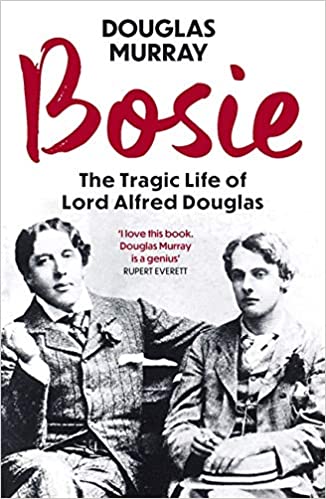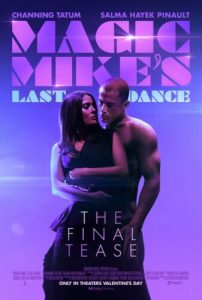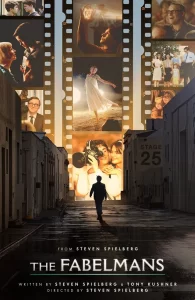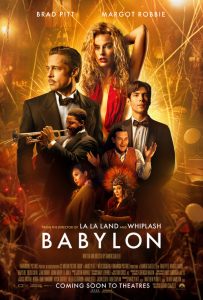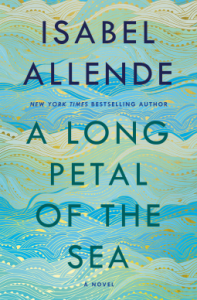Category: DavidGeeBlog
David at the Movies: a comedy about death and dementia?
ALLELUJAH
Alan Bennett’s 2018 stage play has been adapted for the screen by Heidi Thomas, whom we mostly know as the writer/creator of Call the Midwife on TV. There are still plenty of lines which are clearly Mr Bennett’s acerbic originals and the play has not been sentimentalized. Far from. This is a bleak drama, intermittently comic, set in the geriatric ward of an old hospital in Yorkshire which is scheduled for demolition. Rightly so. The hospital looks and feels like the one where I had my appendix removed in the 1950s.
Jennifer Saunders is the ward sister, efficiently and briskly coping with everything from assisted showers to incontinence and patient deaths. Judi Dench and Derek Jacobi are among the patients, but the focus is mostly on Joe (David Bradley), a frail old gent hoping to be sent home, and his nerdy son Colin (Russell Tovey, the go-to actor for gay roles), who is on the team planning the new hospital.
The Bennett pedigree guarantees brilliant writing and all the cast do eminent justice to the script, but the tone of the movie is unremittingly glum, largely focused on death and dementia, and the dimly lit hospital adds more gloom. The ending is a bit rushed and not entirely in tune with what’s gone before.
Like The Banshees of Inisherin, this is a dark comedy that is perhaps a bit too dark. Alan Bennett has not lost his touch, but the humour in Allelujah is over-laced with bile and bitterness. Living, the Bill Nighy movie a couple of months ago, managed to find more lightness in a dark theme.
What I’m reading: Lord Alfred – Oscar Wilde’s toyboy and nemesis
Douglas Murray: BOSIE
This detailed and thoroughly researched biography of Lord Alfred Douglas was published over twenty years ago, so mine is a rather late review. Bosie here comes across as a bitter, vindictive man torn between love and hate for Oscar Wilde, whose downfall was brought about as much by Bosie and his father as by his own love of life in the gutter (from where, as we know, there is a view of the stars).
The young Bosie has been accurately portrayed in all the movies: lazy, spoiled and petulant. He graduated from college flirtations to commercial sex with London rent-boys (then called ‘renters’). Wilde was going to seed by the time they met; Bosie’s infatuation was more for the playwright and wit than for the bedroom partner. But he loyally visited Oscar every day while he was awaiting trial for sexual offences after the collapse of his libel case against Bosie’s father, the Marquess of Queensberry.
Breaking an oath to his wife that he would not see Bosie again, Wilde was reunited with him in Rouen after his release from prison. They lived for some months in a rented villa near Naples where Oscar wrote ‘The Ballad of Reading Gaol’, his last work, and Bosie wrote some of his best poems. The pair were forced to separate when first Mrs Wilde (reverting to her maiden name Constance Holland) and then Bosie’s mother withdrew their financial support.
Bosie did not see Wilde during his last days in Paris in 1900, but he paid for Oscar’s funeral. Less than two years later he married Olive, a fellow poet with (some say) lesbian leanings. They had a son who ended up in a mental hospital, and although the marriage failed they remained friends and confidants until Olive’s death in Hove in 1944 (Bosie died, also in Sussex, a year later).
Douglas Murray believes Bosie ‘went straight’ after he converted to Catholicism and married Olive. But he never could not let go of the past. He wrote several books about his relationship with Wilde and got involved in a long series of libel cases, many centred on Robert Ross, Oscar’s ‘ex’ from way back who deserves much of the credit for safeguarding Wilde’s legacy, the plays. Bosie edited a series of short-lived literary magazines and ‘discovered’ some notable poets, including Siegfried Sassoon and Rupert Brooke. He took against the emerging modern poetry after the Great War and especially hated T.S. Eliot, never missing a chance to slag him off in letters to, among others, Bernard Shaw and Marie Stopes!
Murray’s major achievement is perhaps in arguing the case for Bosie to be recognized as a poet of some significance. Several critics of the time (and again when he was republished in the 1950s) rank Alfred Douglas’s sonnets alongside Shakespeare’s. How highly is he rated today? His early poems (many invocations to ‘the love that dare not speak its name’) are a bit twee. The middle ones are vituperative, reflecting his long period of litigiousness. Then sanctimony gets the better of him as he becomes an increasingly hardcore Catholic and denounces homosexuality.
This is not an easy book to read, especially for non-poetry lovers. Full of a queeny bitchiness and endlessly self-pitying, Alfred Douglas was neither lovable nor likeable. In death as in life, Bosie gets co-star status in the drama of the rise and fall of a great literary figure.
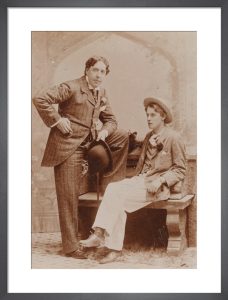
David at the Movies: Not the Full Monty
MAGIC MIKE’S LAST DANCE
Despite its threadbare storyline this third instalment of the Magic Mike story is fairly watchable, almost entirely due to the charisma of Channing Tatum, who is not only sexy as all-get-out (or ‘all-get-off’!) but extremely likeable – lovable even. Mike is rescued from working as a bartender in Florida by rich-bitch Salma Hayek who takes him to London to stage a strippergram version of an ailing West End play in a theatre her husband owns.
Hayek is slumming in this role but she throws herself into it much as when she played the vampire dancer in Tarantino’s From Dusk to Dawn. Steven Soderbergh, who directed this and the first of the trilogy but not the second, is also slumming but he gives the movie plenty of pace and pizzazz. None of the new troupe of dancers gets a decent back story, and the show-stopping finale amounts to no more than a series of raunchy Madonna-style music videos. Nobody actually goes ‘the Full Monty’, which feels like a rip-off. The opening scene, in which Sayek purchases a sensationally erotic private dance from Tatum, is the highlight not only of this episode but of the entire series – and probably worth the price of admission.
David at the Movies: Stephen Spielberg shares his boyhood
THE FABELMANS
Another movie about Hollywood, but altogether softer and gentler in tone than last month’s loud garish Babylon. This one comes from Stephen Spielberg, who has been serving up unforgettable pictures for five decades. The Fabelmans is a fictionalized version of his boyhood. Sammy Fabelman, a Jewish kid growing up in Arizona in the 1950s, is given a movie camera and soon graduates from home movies to amateur action pictures starring his friends and schoolmates as cowboys and battlefield soldiers. His dad (Paul Dano) thinks Sam is wasting time and money, but his mom Mitzi (Michelle Williams) is encouraging, as is his dad’s best friend who Sammy realizes is the other great love of Mitzi’s life. When dad’s job relocates to Los Angeles, Sam has to overcome anti-Semitism at his new school and watch his parent’s marriage collapse, but film-making brings popularity and a puppy-love girlfriend.
The home-life and high-school scenes come with welcome echoes of a hundred other movies (notably, for me, American Graffiti). Gabrielle LaBelle is totally convincing as the nerdy kid living a small life but dreaming big. Michelle Williams gives an Oscar-worthy performance as the neurotic Mitzi.
The film is a bit too long (two-and-a-half hours), but it’s easy to take Sam and his family to your heart, especially when you remember that the real Sammy Fabelman is going to bring us ET and Close Encounters and the Indiana Jones movies a few years from where this story ends.
David at the Movies: I hated this
BABYLON
In the opening scene of Babylon an elephant on a pick-up empties its bowels over one of its handlers. This, I’m sorry to say, sets the tone for much of what follows. This is a long movie – three hours, much of which is crap.
Writer/director Damien Chazelle, who gave us La La Land a few years ago, turns the clock back to the 1920s when “Hollywoodland” was transitioning from silent pictures to sound. Brad Pitt and Margot Robbie play two leading actors who flounder during this period of adjustment, cast in a series of tawdry flops. Diego Calva and Jovan Adepo play a Mexican production assistant and a jazz trumpeter whose careers briefly flare. All four stars make the best of their roles despite the chaotic screenplay. Robbie’s damaged character, a stock favourite, fuelled by addiction to cocaine and gambling, is overdone and risks losing the viewer’s sympathy.
Orgiastic parties and a weird scene in a mountain torture palace presided over by Tobey Maguire in overdrive bring echoes of historic Babylon and some of the weirder extremes of early Hollywood. And there are many references to Singing in the Rain, that gem of a film set in the same era as this mash-up – one of the all-time greatest movies. With its messy script, erratic direction and uneven editing, Babylon is in an altogether different league. I can’t think of a picture I’ve hated as much as this. Sorry!
What I’m reading: Another epic romance from Isabel Allende
Isabel Allende: A LONG PETAL OF THE SEA
Spain 1938. Victor Dalmau, a trainee doctor, flees the civil war that is tearing his country apart. He escapes over the mountains with Roser, a gifted pianist pregnant by his brother who is one of the thousands of victims of Franco’s remorseless tyranny.
From France the pair are evacuated to a new life in Chile. A deep platonic love – and Roser’s son – binds them, although they both have intense affairs with other people. Chile, like Spain, goes through turbulent times. The Marxist Salvador Allende (a cousin of the author) wins the presidency of Chile for only a few years before a military coup installs the brutal Fascist Pinochet regime, forcing Victor and Roser to seek exile again, this time in Venezuela.
In middle age their love for each other finds a new passion and a new depth. They return to Chile to live out their lives, despite the rigours of life under Pinochet. Better years lie ahead for Chile.
Isabel Allende writes beautifully, although in this book I felt her new translators did not quite serve her as majestically as their predecessors. A Long Petal of the Sea (the title is taken from a poem by Palbo Neruda, who appears as a character in the novel) is one of her greatest stories, up there with House of the Spirits and Daughter of Fortune (my two favourites): an epic story of love and loss played out against the changing tides of history. At her best – and she is at her best here – Allende is one of the greatest living writers. This is a romance both ‘of its time’ and timeless.
Putting Up With Parkinsons; Me Too

I’ve been doing some online research on Parkinson’s Disease, which like Jeremy Paxman I was diagnosed with last year. Paxman shared his story on ITV last night. The title ‘Living With –‘ was replaced by ‘Putting Up With Parkinson’s’, reflecting how Paxman feels about it. Me too, to borrow a slogan.
There are about 40 symptoms of PD and each patient gets their own ‘pick-n-mix’ selection. Paxman doesn’t seem to have the tremor which I have (left hand only so far and somewhat reduced since I was put on levodopa, the medication of choice) and which most of the other people in the documentary had to varying degrees. Jeremy has a ‘frozen face’ which so far I do not. I have difficulty vocalizing, which means I cannot do book-reading events any more; this seems not to be a problem for Jeremy and isn’t the reason for his retirement from University Challenge. Paxo feels tired all the time, as do I, and he can no longer operate a keyboard – I’ve gone from being a two-finger typist to a single finger, with many a bloop!
Vivid dreams and hallucinations are very common. A neurologist said that over 50% of sufferers develop psychosis. I have vivid dreams, often featuring dead friends and family members (Bruce Willis can play me in the movie!) but so far no hallucinations.

My online research threw up some grim statistics. The progression is usually slow with a gradual decline in mobility and agility (Jeremy, like me, already finds doing up shirt buttons difficult), but PD sufferers have an 80% chance of developing dementia after ten years. We are most likely to die from a fall or from pneumonia (presumably pneumonia brought on following a fall?). Paul Sinha, “Sinnerman” on ITV’s The Chase, who is in Year Three of PD, said he was diagnosed after a fall, as was Paxman. I was diagnosed because of my tremor, two years after my GP assured me that the tremor was “almost certainly not Parkinson’s”, so I don’t know if I’m in Year Two or Year Four. I’ve had four falls at home, the last of which saw me lacerate my scalp when I hit a door jamb – easy to see how such a fall could save me the fare for that one-way trip to Zurich.
Last week I lunched with a Brighton friend and his wife. He’s in Year Twelve of Parkinson’s and has been spared a date with dementia but he looked as if he’d been beaten up, following two falls onto his face in recent weeks. Parkinson’s, like Alzheimer’s, is not a pretty road to go down – I guess there aren’t any pretty roads in this area of terminal decline. £100 million in medical research has not yet found a cure, but more effective slowing-down treatments may be in the pipeline.

“Regrets, I’ve had a few, but then again –” My biggest regret is that I’ve been writing novels for sixty years and I’m still waiting to achieve serious sales as a self-published author or, best of all, get accepted by a mainstream publisher. I’ve always identified with Prince Charles, who had to wait more than sixty years to be King (on the plus side, I’ve been a ‘queen’ for more than sixty years!). I’ve got another novel waiting to go to print (the sequel to Soap-Stud & Blue-Movie Girl) and two more part written, including a follow-on to Lillian and the Italians and a book which does more justice to my mother as a main character (Lillian has elements of my mother’s life but not her spiritual journey). Hopefully, writing and peddling books will keep Alzheimer’s at bay.
Most people seem to live with PD for up to ten or twelve years. Keeping active is key, mentally and physically. As with dementia, the later years look more like a curse than a blessing. Watch this space. My guru of choice has long been Doris Day: Que sera, sera.
David at the movies: Marilyn revisited and reinterpreted
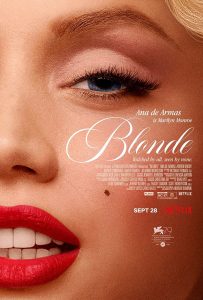
BLONDE
(Netflix)
This biopic of Marilyn Monroe is based on a fictionalized biography by Joyce Carol Oates, so we don’t know how much of it is reality and how much fantasy. Like The Crown, the script flies close to what we think we know as the facts. Early scenes depict Norma Jeane’s wretched childhood with an unstable mother who nearly burned them both to death and was then committed to a mental institution. All through her life this Marilyn is obsessed with the absent father whose identity her mother never revealed.
One brutal session on the “casting couch” presumably represents the many such ordeals Marilyn endured. Her first lover here is Charlie Chaplin Jr whose baby she reluctantly aborts in order to secure the lead in Gentlemen Prefer Blondes. There’s at least one more abortion and a miscarriage. She her husbands “Daddy”. Joe DiMaggio (Bobby Cannavale) is a nice guy but he turns into a wife-beater. Arthur Miller (Adrien Brody) is another nice guy; we’re not shown the break-up of this marriage. The one scene with JFK suggests that the President was not a nice guy in the bedroom. The conspiracy theories about her death are not played out here.
It’s a long, slow movie – almost three hours. Ana de Armas is a sensationally good look-alike and does the breathy voice perfectly. She is nude for much of the movie, which may be intended ironically but it gives Blonde a cruel hard edge. De Armas is dubbed in the re-staged songs – could they not have used the original soundtracks? Some clever CGI inserts the new Marilyn in clips from the actual movies, including the famous subway vent scene from The Seven Year Itch and some high spots from Some Like it Hot.
The screenplay brings out Marilyn’s serious side: she has read Chekhov and takes acting seriously despite all her neuroses and on-set tantrums. But except for the recreation of her famous comedy films, this is a consistently bleak movie, concentrating on Norma Jeane/Marilyn’s endless exploitation; she gets very few happy moments. For me, My Week with Marilyn gave a more rounded portrait of both the actress and the woman, highlighting her great comic talent as well as her instability. And Some Like It Hot is still my all-time favourite movie!
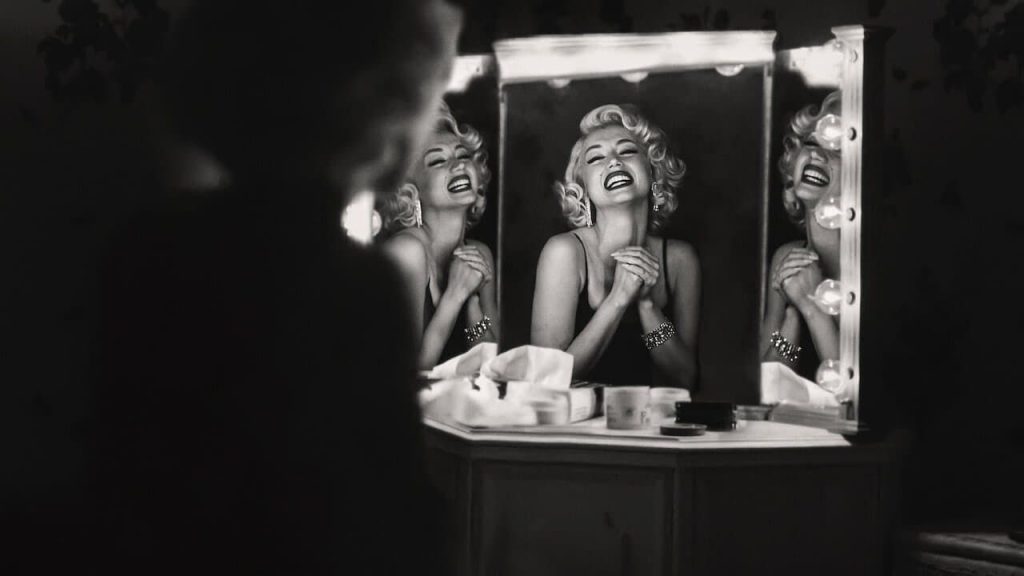
David at the Movies: the King lives on – as garishly as ever
 ELVIS
ELVIS
Mark Kermode’s rave review on BBCtv encouraged me to see this, but I wasn’t as blown away as he was. Austin Butler gives a wildly energetic performance, especially in the “snake-hips” early years, and he sings most of the numbers, but his face often looked as if he was in an animation and I kept getting flashes of Victoria Beckham, not sure why!
The movie is way too long. There’s too much time spent with Tom Hanks’s money-grubbing Colonel Parker and his not-so-secret secrets. Hanks’s accent, veering between B-movie Nazi and Mexican waiter, got on my nerves.
The essence of the Presley mythology is there: the fame, the exploitation in some dire movies, the marriage to Priscilla, the Vegas slippage into drugs and self-parody. As he has in several previous movies, Baz Luhrmann fires up the screen with razzle-dazzle, but I would have liked a bit more depth, more of Presley’s “inner life” – and a lot less Col. Parker.
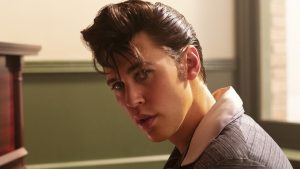
What I’m Reading: “Bona to vada your dolly old eke!”
Paul Baker: FABULOSA
Paul Baker’s study of Polari, the “secret gay language”, wears its intensive research lightly, rarely lapsing into tedium and mostly highly entertaining – altogether totally bona, you might say.
“When you learned Polari, you weren’t just learning the words but the attitude that went with them,” Baker tells us. He trawls (no, not ‘trolls’!) through Polari’s rich ancestry dating back to Victorian and Edwardian times, a cocktail of medieval criminal slang, Romany, Latin crossed with Italian, back-slang (‘riah’ = ‘hair’ backwards) and Cockney or ‘Mockney’ used or invented by Merchant Navy gays (‘sea-queens’). The author mentions Crystal Spring – I wonder if that’s the same Crystal whom I trained at a BT Continental call-centre in the 1960s: she had a wondrous command of Polari.
Polari had a heyday in the 1950s when the odd word dropped into a conversation leaked the fact that you were a fellow traveller; drag-queens overused it as a kind of flag-waving. Julian and ‘my friend Sandy’ introduced it to the wider world on BBC Radio in Round the Horne in the late 1960s, but after Decriminalization in 1967 and the growth of Gay Liberation Polari came to be seen as “a toxic relic of a time that everyone wanted to forget.” Even camp was viewed as regressive; John Inman and Quentin Crisp were pilloried for their mincing limp-wristedness. Imported from the US, the ‘clone’ look created a more manly brand imagine for gay men around the world.
Homophobia hasn’t been totally eradicated in the West today, but most us are freely ‘out’ and ‘Proud’. I wonder how gay men and women secretly communicate their identity in ultra-repressive countries like Uganda and Iran. In Iran homosexuals are not hanged, they’re strangled, hauled off the ground by a crane with a rope round their neck. If they have a secret language, let’s keep it secret.
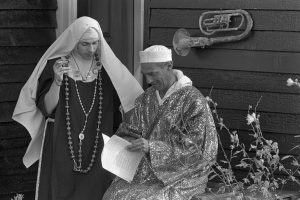
On our cosier shores, camp is still fluttering in the new millennium thanks to RuPaul and his drag-queen cohorts and – God bless ‘em – the Sisters of Perpetual Indulgence whose ‘unholy order’ has outlived some of Rome’s originals! And a few Polari words have entered the general vocabulary: ‘naff’, ‘trade’, ‘butch’. Maybe now, Paul Baker argues, Polari can be recognized as part of the wider History of the Gay Movement, from a time when its use was a kind of defiance. From defiant to dated but not (quite) to defunct.
According to Paul Baker, in the 1960s you could be a ‘chicken’ up to the age of 25, but after that you were old. That was my judgmental mindset in the 1960s, in Earls Court: “Oh God, there’s Grandma” (‘Grandma’ might be in his thirties or forties). No change there today, I’m pretty sure. Sorry, girls!

